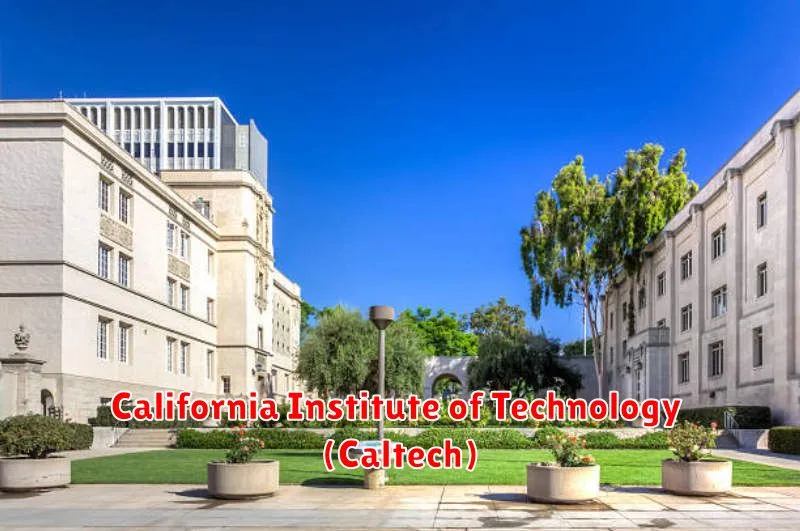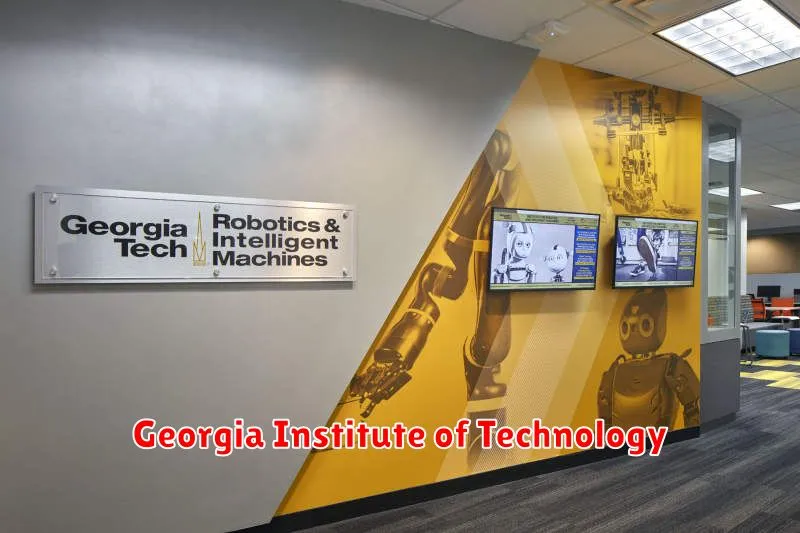Choosing the right university is a critical decision for any prospective student, particularly those pursuing a degree in a STEM (Science, Technology, Engineering, and Mathematics) field. A top-tier university can provide unparalleled opportunities for research, networking, and career development. This article presents the top 10 universities for STEM majors, considering factors such as academic reputation, faculty expertise, research facilities, and career outcomes. This carefully curated list will guide aspiring STEM professionals toward institutions that can best foster their intellectual growth and prepare them for successful careers in these highly competitive fields.
Navigating the complex landscape of higher education can be daunting for students interested in STEM. With so many excellent institutions offering STEM programs, making the right choice requires careful consideration. This ranking of the top 10 universities for STEM majors provides valuable insights into the strengths of each institution, highlighting their contributions to cutting-edge research and their commitment to fostering innovation. Whether your passion lies in computer science, engineering, biology, or mathematics, this article will help you identify the university that best aligns with your academic and professional aspirations, ultimately helping you launch a successful STEM career.
Massachusetts Institute of Technology (MIT)

The Massachusetts Institute of Technology (MIT), located in Cambridge, Massachusetts, is renowned globally as a leader in STEM education and research. Consistently ranked among the top universities worldwide, MIT offers a rigorous and innovative curriculum across a broad range of scientific and technological disciplines.
Key Strengths:
- World-class faculty: MIT boasts a distinguished faculty composed of Nobel laureates, Turing Award winners, and other prominent figures in their respective fields.
- Cutting-edge research: The institute is a hub for groundbreaking research, with extensive resources and facilities dedicated to scientific discovery and innovation.
- Entrepreneurial ecosystem: MIT fosters a vibrant entrepreneurial culture, encouraging students to translate their ideas into real-world solutions and startups.
MIT’s commitment to hands-on learning and practical application provides students with a comprehensive and highly sought-after education, preparing them for impactful careers in STEM.
Stanford University

Located in the heart of Silicon Valley, Stanford University boasts a world-renowned reputation for its STEM programs. The university’s proximity to major tech companies provides unparalleled opportunities for internships, research collaborations, and future employment.
Strong departments include Computer Science, Engineering, and Physics, consistently ranking among the top in the nation. Students benefit from state-of-the-art facilities, a distinguished faculty, and a culture of innovation that encourages groundbreaking research and entrepreneurial pursuits.
Key features:
- Location: Stanford, California
- Notable Alumni: Sergey Brin, Larry Page, Elon Musk
- Focus: Interdisciplinary research and practical application
University of California, Berkeley

The University of California, Berkeley (UC Berkeley) is a public land-grant research university located in Berkeley, California. Established in 1868, it is the flagship institution of the University of California system and consistently ranks among the top universities worldwide.
UC Berkeley is renowned for its strong STEM programs, offering a wide array of undergraduate and graduate degrees in fields such as engineering, computer science, physics, and biology. The university’s faculty includes numerous Nobel laureates, Turing Award winners, and National Medal of Science recipients, highlighting its commitment to research and innovation.
Students benefit from a vibrant campus culture, access to state-of-the-art facilities, and a curriculum that emphasizes critical thinking and problem-solving. UC Berkeley’s proximity to Silicon Valley provides unique opportunities for internships and collaborations with leading tech companies.
Key STEM Departments:
- College of Engineering
- College of Letters and Science (for various STEM disciplines)
- College of Natural Resources
- College of Chemistry
California Institute of Technology (Caltech)

The California Institute of Technology (Caltech) is a world-renowned private research university located in Pasadena, California. Known for its strong emphasis on science and engineering, Caltech consistently ranks among the top universities globally. Its small size fosters a close-knit community and allows for exceptional undergraduate research opportunities.
Caltech’s rigorous curriculum challenges students to push the boundaries of knowledge. The faculty includes numerous Nobel laureates and distinguished scholars. The institute’s small student-to-faculty ratio ensures personalized attention and mentorship.
Key areas of study include aerospace engineering, chemical engineering, chemistry, computer science, electrical engineering, geological and planetary sciences, mathematics, mechanical engineering, and physics.
Harvard University

Established in 1636, Harvard University is the oldest institution of higher learning in the United States and is renowned globally for its academic excellence. Located in Cambridge, Massachusetts, Harvard consistently ranks among the top universities worldwide, attracting exceptional students and faculty across diverse disciplines.
For students pursuing STEM fields, Harvard offers unparalleled opportunities. The John Harvard Distinguished Science Fellows Program supports promising early-career scientists. The School of Engineering and Applied Sciences provides cutting-edge research facilities and a curriculum focused on solving complex real-world problems.
Strong STEM programs at Harvard include:
- Bioengineering
- Computer Science
- Mathematics
- Physics
- Chemistry
With a robust alumni network and a history of groundbreaking research, Harvard provides STEM graduates with a strong foundation for a successful career.
University of Cambridge

Established in 1209, the University of Cambridge is a world-renowned institution consistently ranked among the top universities globally. Its reputation for academic excellence, particularly in STEM fields, draws exceptional students and faculty from around the world.
Cambridge offers a rigorous curriculum and fosters a collaborative learning environment. Students benefit from small class sizes and close interaction with leading researchers in their chosen disciplines.
Key STEM departments include:
- Engineering
- Mathematics
- Physics
- Computer Science
- Natural Sciences
The university boasts state-of-the-art facilities and provides ample research opportunities for undergraduates, encouraging innovation and discovery.
ETH Zurich (Switzerland)

ETH Zurich, the Swiss Federal Institute of Technology in Zurich, consistently ranks among the world’s best universities, especially for STEM fields. Its reputation is built upon a strong emphasis on scientific research and practical application.
Known for its rigorous academic standards and cutting-edge facilities, ETH Zurich offers a wide range of programs in engineering, science, and technology. Students benefit from a highly international environment and close ties to industry.
Key Strengths:
- World-renowned faculty
- Focus on innovation and entrepreneurship
- State-of-the-art research infrastructure
National University of Singapore (NUS)

The National University of Singapore (NUS) consistently ranks among the top universities globally and is a leading institution for STEM education in Asia. It offers a wide array of STEM programs, from traditional engineering disciplines to cutting-edge fields like data science and artificial intelligence.
NUS is known for its strong emphasis on research and innovation, providing students with numerous opportunities to engage in hands-on projects and collaborate with leading researchers. The university’s modern facilities and state-of-the-art equipment further enhance the learning experience.
Key strengths of NUS’s STEM programs include a rigorous curriculum, experienced faculty, and a vibrant international student community. Graduates of NUS are highly sought after by employers worldwide, thanks to the university’s strong reputation and the practical skills they acquire during their studies.
Key features:
- Emphasis on Experiential Learning: Students participate in internships, research projects, and design competitions.
- Global Perspective: NUS fosters a diverse environment and encourages global collaborations.
- Strong Industry Connections: Partnerships with leading companies create opportunities for internships and employment.
University of Oxford

The University of Oxford, located in Oxford, England, is a world-renowned institution consistently ranked among the very best. Its rich history and dedication to academic excellence make it a top choice for STEM majors.
Oxford offers a rigorous curriculum across a wide range of STEM fields, including Mathematics, Physics, Engineering, and Computer Science. Students benefit from small class sizes, access to cutting-edge research facilities, and a vibrant intellectual community.
The tutorial system, a hallmark of Oxford education, provides students with personalized instruction and mentorship from leading experts in their chosen fields.
Key Strengths:
- World-class faculty and research opportunities
- Personalized tutorial system
- Strong emphasis on critical thinking and problem-solving
Georgia Institute of Technology

Georgia Institute of Technology, commonly referred to as Georgia Tech, is a public research university located in Atlanta, Georgia. Renowned for its strong focus on STEM fields, Georgia Tech consistently ranks among the top universities in the United States.
Georgia Tech offers a wide range of highly-ranked undergraduate and graduate programs in engineering, computing, science, and business. The university’s emphasis on practical application and research provides students with valuable skills and experience.
Key strengths of Georgia Tech include its rigorous academics, state-of-the-art facilities, and close ties to industry. These factors contribute to a high level of career preparedness among graduates.
Popular majors at Georgia Tech include:
- Aerospace Engineering
- Computer Science
- Mechanical Engineering
- Electrical Engineering
- Industrial Engineering

